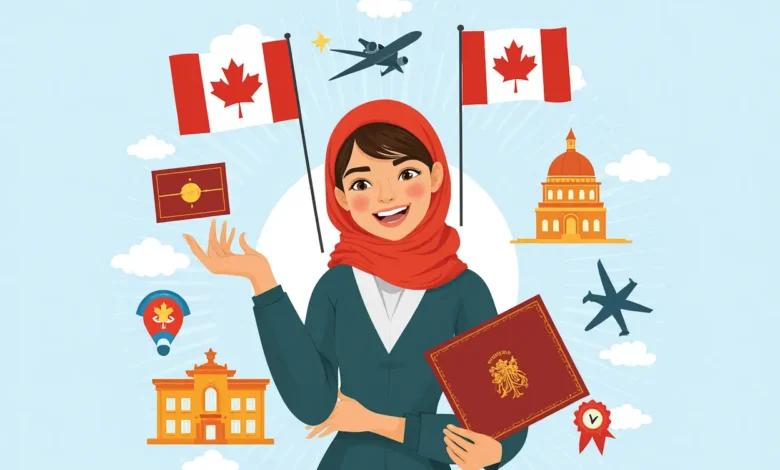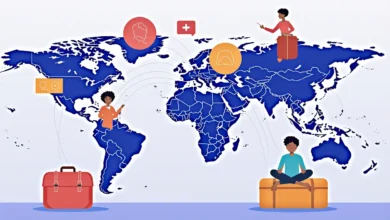Complete Guide: How to Immigrate to Canada 2025

Your Dream of Moving to Canada Starts Here
Hey there! So you’re thinking about making Canada your new home? That’s awesome! I’m here to walk you through everything you need to know about how to immigrate to Canada in 2025. Think of me as your friendly guide who’s going to break down this whole process into bite-sized pieces that actually make sense.
Canada is still one of the most welcoming countries in the world, and honestly, 2025 brings some exciting opportunities. The Canadian government plans to welcome 395,000 new permanent residents in 2025, which means there are plenty of spots available for people like you who are ready to start fresh.
But here’s the thing – immigration can feel overwhelming when you first start looking into it. There are so many programs, requirements, and documents that it’s easy to get lost. Don’t worry though, by the end of this guide, you’ll have a crystal-clear roadmap to follow.
Table of Contents
Why Canada Should Be Your Top Choice to Immigrate
Before we dive into the how-to part, let me quickly remind you why Canada is such an incredible place to call home. The healthcare system is universal and free, the education system is world-class, and the job market is pretty robust across many sectors.
For 2025, Canada is prioritizing healthcare occupations, trade occupations, and French-language proficiency, which gives you some insight into where the opportunities are headed.
Plus, Canada is known for being incredibly diverse and welcoming to newcomers. You’ll find communities from almost every corner of the world, making it easier to feel at home while you’re building your new life.
Understanding Canada’s Immigration System in 2025
Let’s start with the basics. Canada’s immigration system has several pathways, but they generally fall into these main categories:
Economic Class Programs: These are for skilled workers who can contribute to Canada’s economy. This includes Express Entry, Provincial Nominee Programs, and Quebec-selected skilled workers.
Family Class: If you have Canadian citizens or permanent residents in your family, they might be able to sponsor you.
Refugee and Protected Persons: For those seeking protection in Canada.
Other Programs: Including caregivers, self-employed persons, and entrepreneurs.
For most people reading this, the Economic Class programs will be your best bet, especially if you’re a student, young professional, or skilled worker.
Step 1: Choose the Right Immigration Program to Canada
This is where things get interesting. Let me break down your main options:
Express Entry System: Your Fast Track to Immigrate to Canada
Express Entry is like the VIP lane of Canadian immigration. It’s an online system that manages three federal economic immigration programs:
Federal Skilled Worker Program (FSWP): Perfect if you have skilled work experience and want to live anywhere in Canada except Quebec.
Canadian Experience Class (CEC): Great if you already have Canadian work experience or studied in Canada. In 2025, there’s a focus on candidates with experience working in Canada through the Canadian Experience Class.
Federal Skilled Trades Program (FSTP): Ideal for people with experience in skilled trades.
Here’s how it works: You create an online profile, get ranked based on factors like age, education, language skills, and work experience, then wait for an invitation to apply for permanent residence.
Provincial Nominee Program (PNP): Your Regional Route
Each province and territory (except Quebec) has its own Provincial Nominee Program. These programs are designed to meet specific local labor market needs. If a province nominates you, you get extra points in Express Entry, which dramatically improves your chances.
Quebec Immigration: A Different Path
Quebec has its own immigration system. If you’re interested in living in this beautiful French-speaking province, you’ll need to apply through Quebec’s programs, which have their own requirements and processes.
Step 2: Check Your Eligibility to Immigrate to Canada
Before you get too excited, let’s make sure you actually qualify. Don’t worry – if you don’t meet the requirements now, I’ll show you how to improve your profile later.
Express Entry Minimum Requirements
For the Federal Skilled Worker Program, you need to score at least 67 points out of 100 on these factors:
- Language Skills (28 points max): You need to prove proficiency in English and/or French through approved tests
- Education (25 points max): Your foreign education credentials need to be assessed and recognized
- Work Experience (15 points max): At least one year of continuous full-time skilled work experience
- Age (12 points max): You get maximum points if you’re between 18-35 years old
- Arranged Employment (10 points max): Having a job offer gives you bonus points
- Adaptability (10 points max): Previous study or work in Canada, relatives in Canada, etc.
The Comprehensive Ranking System (CRS) Score
Once you’re eligible, you’ll be ranked using the CRS, which gives you a score out of 1,200 points. All Express Entry candidates get a score based on four parts of the Comprehensive Ranking System formula, and the government invites the highest-ranking candidates.
The competition is real – in 2024, CRS scores ranged between 486 and 561, with an average cutoff around 525. But don’t let that discourage you! There are ways to boost your score.
Step 3: Improve Your Immigration Profile
If your current score isn’t competitive enough, here are some strategies to boost it:
Master the Language Tests
Language proficiency is huge in the CRS. Take the IELTS (for English) or TEF (for French) and aim for the highest scores possible. Even going from CLB 7 to CLB 9 in English can add significant points to your profile.
Pro tip: Learning French can be a game-changer. French-language proficiency is a priority for 2025, and bilingual candidates get substantial bonus points.
Get Your Education Assessed
Make sure your foreign credentials are properly evaluated through Educational Credential Assessment (ECA). Sometimes, what you think is equivalent to a bachelor’s degree might actually be assessed as a master’s degree, giving you more points.
Gain Canadian Experience
If possible, try to get Canadian work or study experience. This not only gives you direct points but also makes you eligible for the Canadian Experience Class, which often has lower CRS cut-offs.
Consider Provincial Nomination
A provincial nomination adds 600 points to your CRS score, which basically guarantees you’ll get an invitation. Research which provinces align with your skills and consider applying to their PNP programs.
Step 4: Gather Your Documents to Immigrate to Canada
Once you know which program you’re applying for, it’s time to get your paperwork in order. This is probably the most time-consuming part, so start early.
Essential Documents You’ll Need:
- Language Test Results: IELTS, CELPIP, TEF, or TCF results that are less than two years old.
- Educational Credential Assessment (ECA): From a designated organization like WES, IQAS, or ICES.
- Work Experience Letters: Detailed reference letters from all your employers showing your job duties, employment dates, and salary.
- Police Certificates: From every country you’ve lived in for six months or more since age 18.
- Medical Examinations: From a panel physician approved by Immigration, Refugees and Citizenship Canada (IRCC).
- Proof of Funds: Bank statements showing you have enough money to support yourself and your family in Canada.
- Birth Certificate, Marriage Certificate: If applicable.
- Passport: Valid for at least six months.
Getting Your Documents Ready: Pro Tips
Start collecting documents early because some can take months to obtain. For work reference letters, make sure they’re on company letterhead and include specific details about your job duties that match the National Occupational Classification (NOC) code you’re claiming points for.
For police certificates, each country has different procedures and processing times. Some might take several months, so don’t wait until the last minute.
Step 5: Create Your Express Entry Profile
Now comes the exciting part – actually entering the pool! Creating your Express Entry profile is free and takes about an hour if you have all your documents ready.
What to Include in Your Profile:
Be completely honest and accurate. Any misrepresentation can lead to a ban from applying to Canada for several years. Double-check every detail, especially dates and personal information.
Make sure your work experience descriptions match your reference letters and the NOC code you’re claiming. This consistency is crucial for avoiding delays or rejections later.
After Submitting Your Profile
Once your profile is in the system, you’ll get your CRS score and be ranked against other candidates. As of March 25, 2025, job offer points have been removed from the Comprehensive Ranking System, which changes the dynamics slightly but levels the playing field for international candidates.
Your profile is valid for one year, and you can update it anytime to improve your score or fix any errors.
Step 6: Wait for Your Invitation to Apply (ITA)
This is the hardest part – waiting. Express Entry draws typically happen every two weeks, and the government invites candidates with the highest CRS scores to apply for permanent residence.
What Happens During the Wait:
Keep improving your profile if possible. Take language tests again, gain more work experience, or apply for Provincial Nominee Programs. Remember, Express Entry categories are based on identified economic goals, so category-based draws might give you better chances if you fit specific criteria.
Stay positive and use this time productively. Learn about Canadian culture, research where you want to live, and maybe even start networking with professionals in your field who are already in Canada.
Step 7: Submit Your Application for Permanent Residence
Got your ITA? Congratulations! Now you have 60 days to submit your complete application for permanent residence. This is when you’ll upload all those documents you’ve been collecting.
The Application Process:
The application fee for the primary applicant is CAD $1,365, plus CAD $230 for each family member. You’ll also need to pay the Right of Permanent Residence Fee of CAD $515 per adult.
Make sure every document is properly formatted, translated (if necessary), and clearly labeled. The clearer and more organized your application, the faster it will be processed.
Processing Times
Most Express Entry applications are processed within six months. However, processing times can vary depending on the completeness of your application and current volumes.
Alternative Pathways to Immigrate to Canada
Express Entry isn’t the only way in. Let me tell you about some other options that might work better for your situation:
Study in Canada First
Getting a Canadian education can be an excellent pathway to permanent residence. International students can work part-time during studies and full-time during breaks. After graduation, you can apply for a Post-Graduation Work Permit, gain Canadian work experience, and then apply through the Canadian Experience Class.
Family Sponsorship
If you have close relatives who are Canadian citizens or permanent residents, they might be able to sponsor you. This includes spouses, children, parents, grandparents, and in some cases, other relatives.
Start-up Visa Program
Got a great business idea? The Start-up Visa Program is for entrepreneurs with innovative business ideas who can get support from designated Canadian angel investor groups, venture capital funds, or business incubators.
Self-employed Persons Program
If you’re self-employed in cultural activities, athletics, or farm management, this program might be for you. You need to show you can make a significant contribution to Canadian cultural or athletic life, or be able to buy and manage a farm.
Understanding the Costs to Immigrate to Canada
Let’s talk money – because immigrating to Canada isn’t free. Here’s a breakdown of what you can expect to spend:
Government Fees:
- Express Entry application: CAD $1,365 (primary applicant) + CAD $230 (each additional family member)
- Right of Permanent Residence Fee: CAD $515 per adult
- Biometrics: CAD $85 per person
Additional Costs:
- Language tests: CAD $300-400
- Educational Credential Assessment: CAD $200-400
- Medical examinations: CAD $300-500 per person
- Police certificates: Varies by country
- Document translations: CAD $20-50 per page
Proof of Funds Requirements:
You need to show you have enough money to support yourself and your family. For a family of four, that’s about CAD $25,000. This money needs to be readily available and not tied up in investments or property.
Living in Canada: What to Expect After You Immigrate
Okay, let’s say everything goes well and you get your permanent residence. What’s next?
Finding Your First Job
Canadian employers often prefer Canadian work experience, which can be frustrating for newcomers. Consider starting with survival jobs while you network and look for positions in your field. Join professional associations, attend networking events, and don’t be afraid to volunteer to gain Canadian experience and references.
Healthcare and Education
As a permanent resident, you and your family will have access to Canada’s universal healthcare system. Each province has its own health insurance plan, and there’s usually a waiting period of up to three months after you arrive.
For education, your children can attend public school for free, and you’ll have access to more affordable tuition rates at Canadian universities and colleges.
Building Your Credit History
You’ll need to build a credit history from scratch in Canada. Start by opening a bank account, getting a secured credit card, and paying all your bills on time. A good credit score is essential for getting a mortgage, car loan, or even renting an apartment.
Common Mistakes to Avoid When You Immigrate to Canada
I’ve seen people make these mistakes, so learn from their experiences:
Not preparing financially: Moving to Canada is expensive, and it often takes longer than expected to find employment in your field. Have at least 6-12 months of living expenses saved up.
Ignoring smaller cities: Everyone wants to move to Toronto or Vancouver, but smaller cities often have better job opportunities, lower living costs, and faster immigration pathways through PNPs.
Not networking: Canada is all about networking. Start building connections even before you arrive. Join LinkedIn groups, attend virtual events, and reach out to people in your field.
Underestimating credential recognition: Even with an ECA, you might need additional certification or training to work in your field in Canada. Research this before you arrive.
Not learning about Canadian workplace culture: Canadian workplace culture might be different from what you’re used to. Soft skills and cultural fit are often as important as technical qualifications.
Timeline: How Long Does It Take to Immigrate to Canada?
Here’s a realistic timeline for the Express Entry process:
- Preparation Phase: 6-12 months to gather documents, take language tests, and improve your profile.
- In the Pool: Could be anywhere from a few weeks to over a year, depending on your CRS score and draw patterns.
- After ITA: 60 days to submit your application, then 6 months for processing.
- Total Time: Realistically, plan for 12-24 months from start to finish.
- Remember, this is just for the immigration process. Actually settling in Canada and building your life there will take additional time.
Resources and Tools to Help You Immigrate to Canada
Here are some official resources that will be incredibly helpful throughout your journey:
- IRCC Website: Your go-to source for official information and updates.
- CRS Calculator: Use this to estimate your score before creating your profile.
- Come to Canada Tool: This wizard helps determine which programs you might be eligible for.
- Job Bank: Canada’s official job site where you can research job opportunities and wage information.
Frequently Asked Questions About Immigrating to Canada
Q: Can I immigrate to Canada without a job offer?
A: Absolutely! Most Express Entry candidates don’t have job offers. While a valid job offer can boost your CRS score, it’s not required for most programs. Focus on improving other factors like language skills, education, and work experience.
Q: Is it too late to immigrate to Canada if I’m over 35?
A: Not at all! While you get maximum points for age if you’re between 18-35, you can still immigrate at any age. Many people successfully immigrate to Canada in their 40s, 50s, and even 60s. Focus on maximizing other factors like language skills and work experience.
Q: Do I need to speak French to immigrate to Canada?
A: For most programs, you don’t need French, but it can significantly boost your CRS score if you’re bilingual. French is only mandatory if you’re applying to Quebec or certain French-speaking communities. However, given Canada’s focus on French-language proficiency in 2025, learning French could give you a competitive advantage.
Q: How much money do I need to show as proof of funds?
A: The amount depends on your family size. For a single person, you need CAD $13,757. For a couple, it’s CAD $17,127. For a family of four, you need CAD $25,564. This money must be readily available and not tied up in investments or property that you can’t easily liquidate.
Q: Can I include my spouse in my application?
A: Yes! You can include your spouse or common-law partner and dependent children in your application. Including your spouse might actually help your CRS score if they have good language skills, education, or Canadian experience. However, make sure to consider whether you or your spouse would be the stronger principal applicant.
Your Next Steps to Immigrate to Canada
Alright, we’ve covered a lot of ground! Here’s what you should do right now to get started on your journey to immigrate to Canada:
- Take the “Come to Canada” eligibility quiz on the IRCC website to see which programs you might qualify for.
- Calculate your estimated CRS score using the online calculator to see where you stand.
- Start preparing for language tests – book your IELTS or CELPIP test if you haven’t already.
- Begin gathering your documents – this takes the longest, so start now.
- Research Provincial Nominee Programs in provinces that interest you and align with your skills.
- Consider taking French classes if you’re serious about maximizing your chances.
Remember, immigrating to Canada is a marathon, not a sprint. It requires patience, preparation, and persistence. But trust me, when you’re holding that Confirmation of Permanent Residence document in your hands, all the effort will be worth it.
Canada truly is an incredible place to build a life, raise a family, and pursue your dreams. The country’s diversity, opportunities, and quality of life make it one of the best destinations in the world for newcomers.
Don’t let the process intimidate you. Thousands of people just like you successfully immigrate to Canada every year. With proper preparation, realistic expectations, and determination, you can be one of them.
Your new life in Canada is waiting for you. The question isn’t whether you can do it – it’s when you’ll start. Good luck, and welcome to your Canadian adventure!


